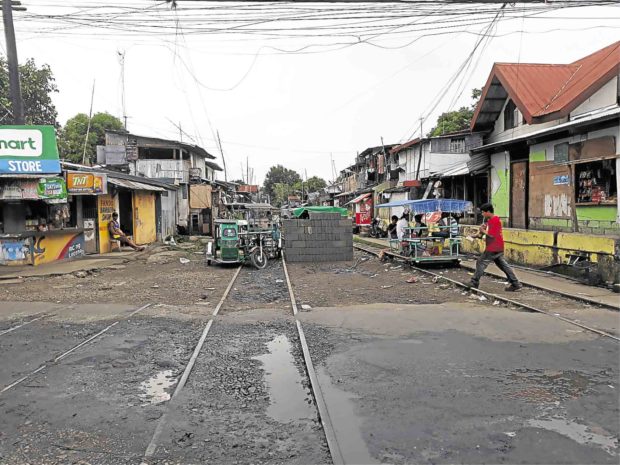Cheap housing for families leaving railway homes

Houses, stores and other structures crowd the railroad track leading to the Philippine National Railways’ station in Lucena City. —DELFIN T. MALLARI JR.
CLARK FREEPORT — The government will resettle 100,000 families occupying the right-of-way of the Philippine National Railways (PNR) South project traversing 653 kilometers from Manila to Batangas, Laguna and Sorsogon provinces, Transportation Secretary Arthur Tugade said here on Friday.
Tugade and PNR officials signed a memorandum of agreement guaranteeing affordable housing programs for families displaced by the new railway projects with James Mark Terry Ridon, chair of the Presidential Commission for the Urban Poor; Marcelino Escalada Jr., general manager of the National Housing Authority (NHA); Arnolfo Cabling, president of the Social Housing Finance Corp.; and Eduardo del Rosario, chair of the Housing and Urban Development Coordinating Council.
The PNR South is expected to be operational in the second quarter of 2022. No timetable or budget for the resettlement was mentioned.
The project will be funded by the Chinese government following a Nov. 15 memorandum of understanding between the Department of Transportation (DOTr) and the Ministry of Commerce of China.
The 72-km commuter line with 23 stations will run from Solis-Hermosa in Manila to Los Baños town in Laguna. The long haul segment begins in Los Baños and extends to Batangas, Sorsogon, Quezon, Camarines Sur and Albay provinces.
Article continues after this advertisementAs of the latest count, 638 families are staying on the abandoned tracks of the PNR project from Manila to Clark, part of the road right-of-way for the new railway project to be built using Japan’s official development assistance.
Article continues after this advertisementTimothy John Batan, transportation assistant secretary for railways, said 414 families would be resettled to make way for Phase 1 of the project that runs from Tutuban in Divisoria, Manila, to the City of Malolos in Bulacan province.
That number, Batan said, was based on the project’s postdetailed engineering resettlement action plan.
Phase 2 of the project from the City of Malolos to Clark will call for the relocation of 224 families, a number that “may still change during the project’s detailed engineering design,” he said.
NorthRail was supposed to run through the cities of Malabon, Caloocan and Valenzuela in Metro Manila; the towns of Meycauayan, Marilao, Bocaue, Balagtas and Guiguinto, and the City of Malolos in Bulacan; and the towns of Apalit, San Simon and San Luis, and the cities of San Fernando, Angeles and Mabalacat in Pampanga province.
The NHA built more than 15 resettlement sites.
The DOTr pressed on with the PNR Clark project after the agency and the NorthRail contractor, Sinomach (China National Machinery Industry Corp.), agreed to drop legal and arbitration cases in early November.
Batan said the DOTr would strictly observe President Duterte’s policy that no houses would be demolished until the families were relocated.